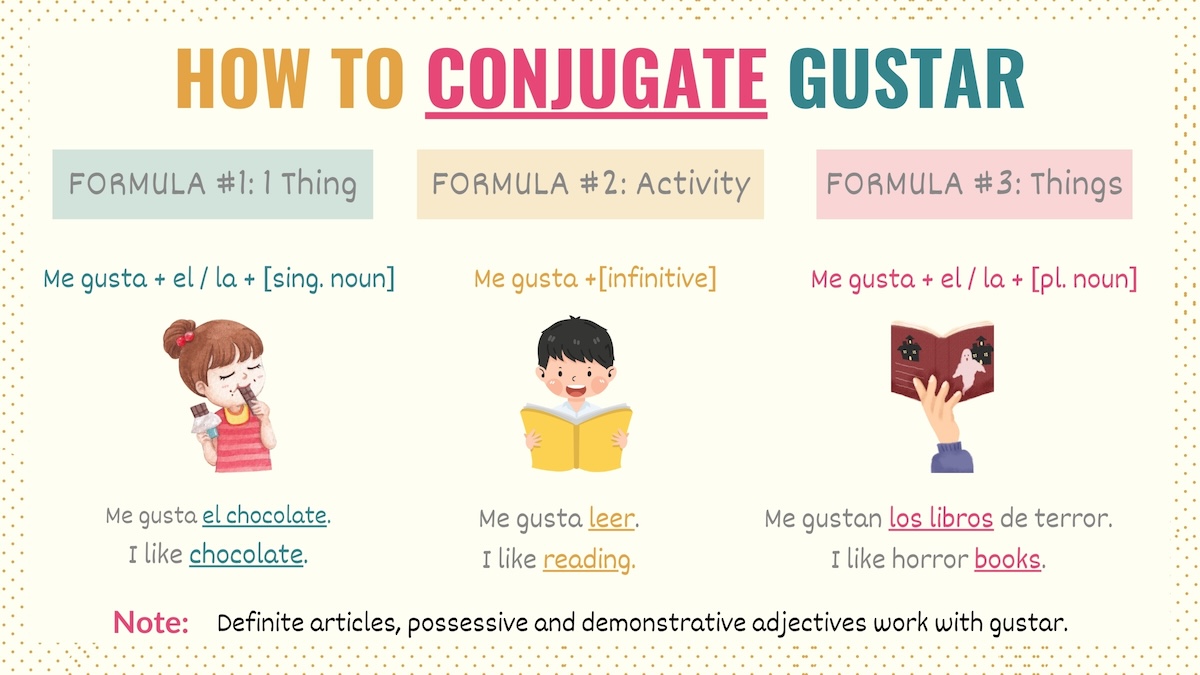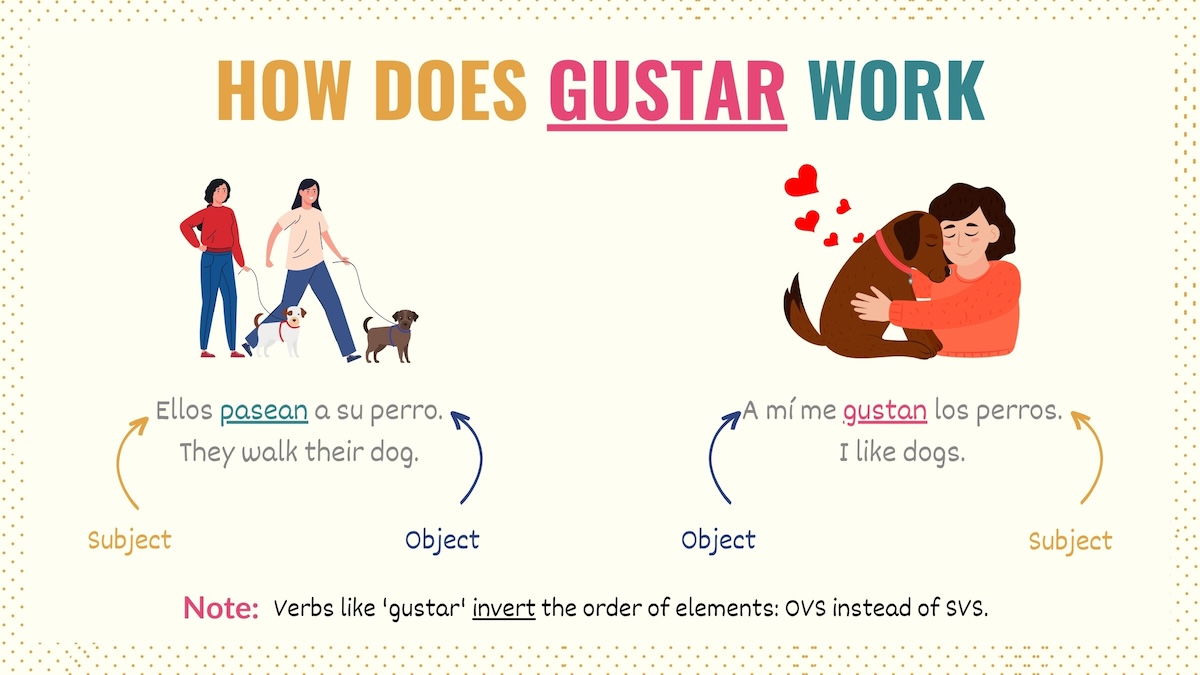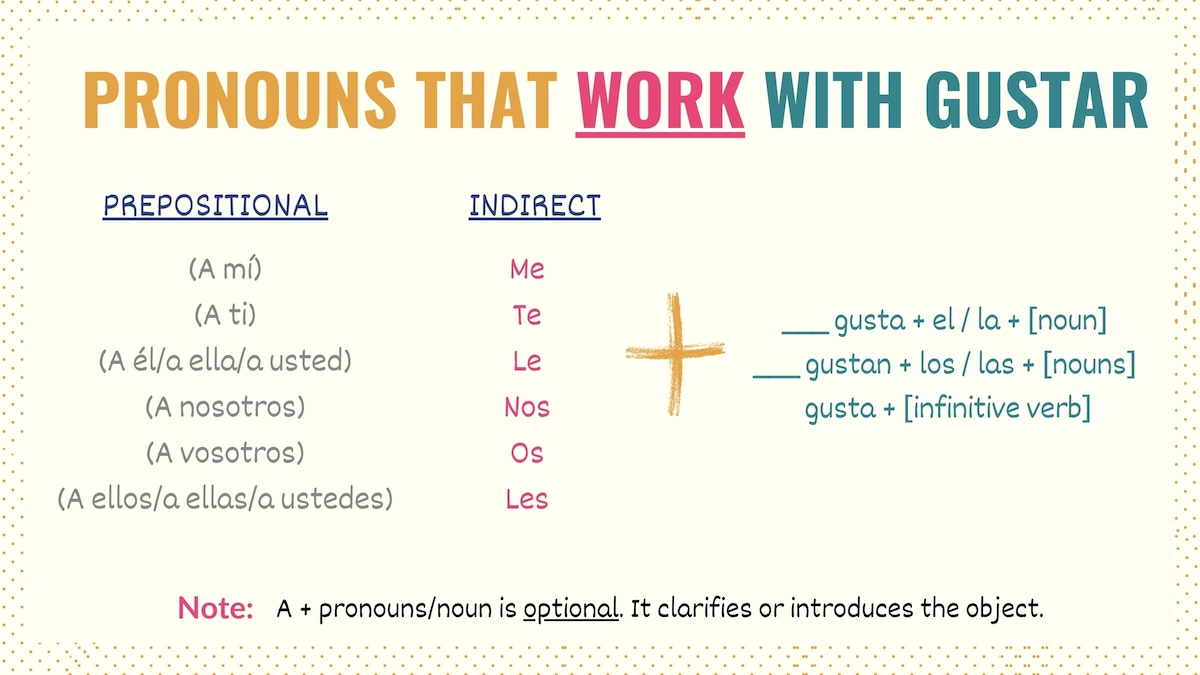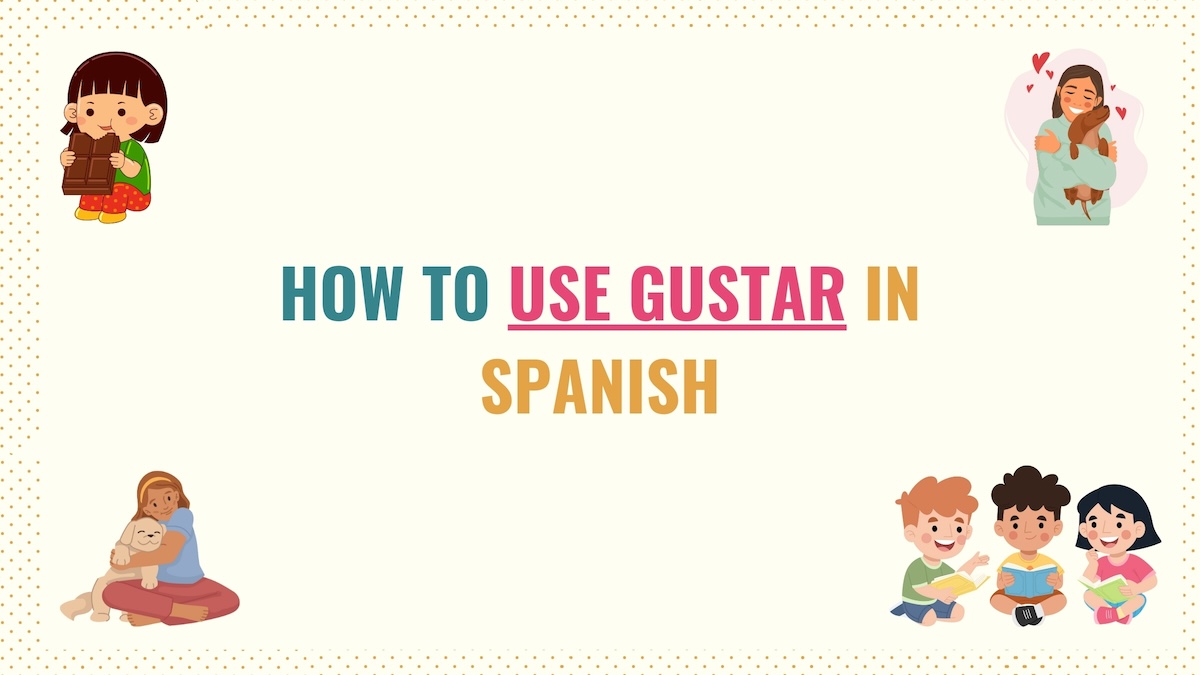The distinction between Gusta vs gustan often confuses most of my Spanish students.
As a singular conjugation, gusta is used with singular nouns or infinitive verbs (a single thing or activity) – Me gusta leer y a ella le gusta el chocolate. Conversely, gustan is used for plural nouns, for example, as in nos gustan los libros de terror.

Beyond this distinction, there are additional rules for using gustar in Spanish that make this verb challenging for both beginner and advanced learners. In the following sections, you’ll learn to master this verb.
How to Use Gustar in Spanish / How Does Gustar Work in Spanish
In Spanish, gustar expresses that an activity or thing causes feelings of liking or disliking in a person. As a result, this activity or thing becomes the subject of the sentence, and gustar is conjugated based on it.
No me gustan las manzanas.
I don’t like apples.
¿Te gusta el café?
Do you like coffee?
Use these examples to understand the gusta vs gustan distinction.
In example #1, las manzanas causes a feeling of liking. As a plural subject, it needs a plural conjugation. In contrast, example #2 features a singular subject, ‘el café’ (the coffee), so the conjugation is singular
Sentences with gustar arrange their elements a bit differently (OVS): the subject of the sentence comes after the verb, rather than before, unlike the usual order.
You can visually see this distinction in this graphic:

But notice that, despite their inverse order, “normal verbs” and verbs like gustar are both conjugated based on the subject.
Take Note: Grammatically, these are the rules for using gustar. Yet, native speakers might also say ‘.las manzanas me gustan’. As a Spanish teacher and native speaker, I recommend getting familiar with both structures.
Watch the Lesson
Watch the Spanish Immersion Lesson!
You can also watch the immersion video to learn how to conjugate and use gustar while practicing your listening comprehension skills.
Gusta vs Gustan: The Different Forms of Gustar
When discussing likes and dislikes, the most common forms of gustar we use are singular and plural (gusta vs gustan). These conjugations differ based on the number of things or activities being discussed.
Use the singular form gusta for one activity or thing. This conjugation works with an infinitive verb or a singular noun.
[Indirect object pronoun] + gusta + (determiner) + [noun/infinitive verb]
No me gusta el chocolate blanco.
I don’t like white chocolate.
A Juan le gustaba tu hermana.
Juan liked your sister.
¿Qué te gusta hacer? A nosotros nos gusta viajar.
What do you like to do? We like to travel.
Notice that when the subject is a noun, we must use Spanish determiners, such as definite articles or possessive adjectives.
Gustan, the plural form, is used to refer to multiple things:
[Indirect object pronoun] + gustan + [plural det.] + [plural noun]
A Juan le gustaron las galletas de chocolate.
Juan liked the chocolate cookies.
¿Crees que a Jessica le gusten estas flores?
Do you think Jessica would like these flowers?
As you can see in the examples above, the rules for using gustar apply consistently across all Spanish tenses.
Take Note: Saying me gustas or tú me gustas (I like you) isn’t incorrect, as gustar is correctly conjugated for the subject (you). However, this phrase implies physical or romantic attraction. Use me caes bien or me agradas to express non-romantic appreciation.
Gustar pronouns
Spanish indirect object pronouns,used with gustar, are:
- Me
- Te
- Nos
- Le
- Nos
- Os
- Les
They indicate who is the person experiencing the feeling of liking or disliking something.
As the indirect object of the sentence, they do not influence the verb conjugation, but they cannot be omitted:
Me gusta la comida china.
I like Chinese food.
Nos gusta la comida china.
We like Chinese food.
Prepositional pronouns and a + noun also work with gustar. These elements clarify, emphasize, or introduce the person experiencing the feeling:
A mí no me gusta el té.
I don’t like coffee.
A Molly y Tim les gustan los gatos.
Molly and Tim like cats.

Take Note: There are many verbs like gustar that follow these patterns and are essential for communication.
Key Points: Gusta vs Gustan
Gusta vs gustan is a challenging topic because these constructions work differently from English. Here are some key points to keep in mind:
- Gusta is for single activities or things. So, it works with singular nouns or infinitive verbs.
- Gustan works with plural nouns since it refers to multiple things.
- With gustar and similar verbs, the subject of the sentence is what causes the feeling. We conjugate the verb based on this subject.
- These sentences use an inverse order: object, verb, subject.
- Indirect object pronouns accompany gustar to show who feels the liking or disliking.
- ‘A + noun/prepositional pronoun’ are used to clarify, emphasize, or introduce the person experiencing the feeling.

